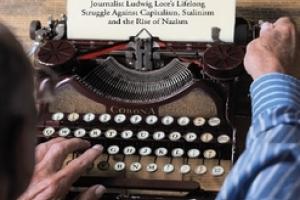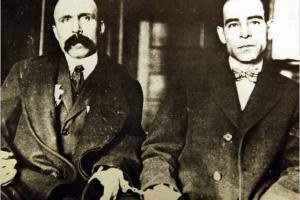Daniel Ellsberg: Nuclear War Planning in USA
Democracy Now!
 After Britain had a mass shooting in 1987, the country instituted strict gun control laws. So did Australia after a 1996 shooting. But the United States has repeatedly faced the same calculus and determined that relatively unregulated gun ownership is worth the cost to society. That choice, more than any statistic or regulation, is what most sets the United States apart.
After Britain had a mass shooting in 1987, the country instituted strict gun control laws. So did Australia after a 1996 shooting. But the United States has repeatedly faced the same calculus and determined that relatively unregulated gun ownership is worth the cost to society. That choice, more than any statistic or regulation, is what most sets the United States apart.
 Ludwig Lore's grandson recounts the life of the revolutionary militant and German emigre who began a new life as a newspaper editor and political commentator. A close associate of Leon Trotsky, Lore was a founder of the American Communist Party until his expulsion when he went on to be be a noted critic of both Stalin and Hitler.
Ludwig Lore's grandson recounts the life of the revolutionary militant and German emigre who began a new life as a newspaper editor and political commentator. A close associate of Leon Trotsky, Lore was a founder of the American Communist Party until his expulsion when he went on to be be a noted critic of both Stalin and Hitler.
 A scholar shares the true story of two men who stood up and spoke out against the murder of American Indians, and how they are celebrated today. Native American tribal members pay their respects at the headstone of Union Officer, Capt. Silas Soule, at the Riverside Cemetery Dec. 03, 2014 in honor of the 150th Anniversary of the Sand Creek Massacre.
A scholar shares the true story of two men who stood up and spoke out against the murder of American Indians, and how they are celebrated today. Native American tribal members pay their respects at the headstone of Union Officer, Capt. Silas Soule, at the Riverside Cemetery Dec. 03, 2014 in honor of the 150th Anniversary of the Sand Creek Massacre.
 Colin Kaepernick, the former quarterback of the San Francisco 49ers, is being blackballed — itself a revealing phrase — from the National Football League with the collusion of the all-white owners. He is ostracized because a year ago he exercised his First Amendment right to free speech by taking a knee during the playing of the national anthem, as a symbol of protest against police shootings of unarmed African-American men.
Colin Kaepernick, the former quarterback of the San Francisco 49ers, is being blackballed — itself a revealing phrase — from the National Football League with the collusion of the all-white owners. He is ostracized because a year ago he exercised his First Amendment right to free speech by taking a knee during the playing of the national anthem, as a symbol of protest against police shootings of unarmed African-American men.
 Most of the various predecessors to FEMA weren’t all that concerned with civilian natural disasters. They were primarily focused on responding to nuclear war; the evolution to being the first call after a hurricane, flood, or tornado came about in part because it turned out America doesn’t have all that many nuclear wars—and the equipment and supply stockpiles and disaster-response experts at FEMA’s predecessors were useful for something other than the apocalypse.
Most of the various predecessors to FEMA weren’t all that concerned with civilian natural disasters. They were primarily focused on responding to nuclear war; the evolution to being the first call after a hurricane, flood, or tornado came about in part because it turned out America doesn’t have all that many nuclear wars—and the equipment and supply stockpiles and disaster-response experts at FEMA’s predecessors were useful for something other than the apocalypse.
 For many people in 1927 and after, the two men were victims of a deep-seated fear of immigrants. For others, they were criminals and terrorists who benefited from a worldwide campaign led by people who despised America and its institutions.Today, the United States is engaged in a bitter struggle between these same two views, with the xenophobic forces currently in political power, especially in the White House.
For many people in 1927 and after, the two men were victims of a deep-seated fear of immigrants. For others, they were criminals and terrorists who benefited from a worldwide campaign led by people who despised America and its institutions.Today, the United States is engaged in a bitter struggle between these same two views, with the xenophobic forces currently in political power, especially in the White House.
 Dolores Huerta has contributed to movements for union rights and social justice since the of the United Farm Workers (UFW). Working with Cesar Chavez, Philip Vera Cruz and others, she helped found what became the UFW. Today, now 86, she works in supporting union democracy, civic engagement and empowerment of women and youth in disadvantaged communities. The UFW changed the nature of labor organizing in the Southwest contributing to the growth of Latino politics in the US
Dolores Huerta has contributed to movements for union rights and social justice since the of the United Farm Workers (UFW). Working with Cesar Chavez, Philip Vera Cruz and others, she helped found what became the UFW. Today, now 86, she works in supporting union democracy, civic engagement and empowerment of women and youth in disadvantaged communities. The UFW changed the nature of labor organizing in the Southwest contributing to the growth of Latino politics in the US
Spread the word